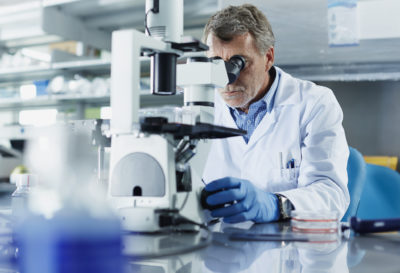Bacteriotherapy is another term for Fecal Microbiota Transplantation. As we stated in our previous Digestive Disorder Consultants, Orlando blog, Bacteriotherapy is still a little shocking to the modern world. Shakespeare stated, “A rose by any other name would smell as sweet.” Well, aroma notwithstanding, bacteriotherapy or Fecal Microbial Transplantation are identical in meaning.

Fecal Microbiota Transplantation: Little Known Medical Treatment.
Both terms indicate a procedure in which stool from a healthy person is introduced into the bowel of a sick patient. This procedure is designed for a patient with a chronic digestive problem. For the record, please note that Fecal Microbiota Transplanation is not within the purview of procedures at DDC Orlando. However, some patients have been referred to research institutions where they have access to stool-banked fecal solutions which are infection controlled. We cover this topic for you because part of our obligation on this blog is to inform you about international research issues that have become hot topics within our field of study. You will undoubtedly encounter it on the Internet or hear about it on the news.
And it has been especially successful in treating Clostridium Difficile Colitis. Studies in Fecal Microbial Transplantation have made news both in medical journals and in mainstream media. You might want to read or review our previous blog at this point.
Modern Bacteriotherapy Marches Against Effects of Antibiotics and Infection
In our previous article, we traced some of the history of this unique treatment. Some doctors are utilizing this ancient practice to treat the ill effects caused by very modern medical advances. You see, antibiotics kill all the bacteria they encounter. And soon the patient has none of the good bacteria that help us process our food. The organisms of Clostridium Difficile are also quite virulent. See our previous article for symptoms.
Fecal microbiota transplantation (FMT) has revealed great success in the treatment of Clostridium Difficile infection (CDI) and, potentially, inflammatory bowel disease (IBD). To put it simply, the good bacteria, the fecal microbiota, set up housekeeping in the ill patient’s bowel. Once transplanted there, they behave naturally, assisting in the digestive process, just as they did in the donor’s body. In medical terms, the microbes begin to rebuild, restore, and “reestablish a normal microbiome.”
Why are We Just Now Hearing about Bacteriotherapy?
Fecal Microbial Transplantation has re-emerged on the medical scene for three big reasons:

Who Ever Heard of Such A Thing?
l. Almost epidemic incidences of Clostridium Difficile have arisen since the early 2000’s.
2. Major advances in microbial sequencing have helped to diagnose C Difficile infections, also called CDI.
3. In the medical arena, studies have proven that in some cases, bacteriotherapy is safer, more cost-effective and more beneficial than the alternatives. By the way, one alternative includes a surgical procedure, known as a colectomy. It is the total removal of the colon. The other alternative uses massive doses of strong antibiotics. Ironically, this is the very same type of substance that permitted bad microbes to take over in the first place. Neither of these are very gentle alternatives.
The Life and Times of Clostridium Difficile Colitis, Bacteriotherapy and Prognosis
Diagnosis is based on a stool DNA test that detects the organism. You might only have the Clostridium Difficile one time. But more often it reasserts itself again and again. Antibiotics used for the treatment of this infection include high powered metronidazole, vancomycin and fidaxomycin. As you might imagine, it’s like fighting fire with fire. Sadly, in 30 percent of patients, the Clostridium Difficile Colitis recurs as soon as the patient finishes the antibiotic prescription. Multiple infections result in a chronic condition. Fecal transplantation has been shown to extremely successful in 87-90 percent of patients.
Everything Old is New Again
Then, in 2013 the New England Journal of Medicine showed that fecal transplantation beat oral Vancomycin in preventing recurrent Clostridium Difficile colitis. The success of the unique treatment has evoked speculation about using the treatment other conditions. Currently, studies are seeing success in the treatment of patients with such conditions as ulcerative colitis. “More research studies are still needed to determine if fecal transplantation should be performed for other clinical indications.”
Who Are You Going To Call? Who is Your Donor?
There is much more to being a donor than just giving up fecal donations. There are a vast array of medical tests that donors must take before they can contribute fetal material for a patient. Physicians typically screen donors with both blood and stool tests.
1. Blood tests for donors include: Hepatitis A, B, and C serologies, HIV, RPR.
2. Stool tests for donors are almost as detailed as blood tests. They are tested for Ova and parasites, Clostridium Difficile and Giardia Antigen.
Donors Must Walk the Line for Good Health
Likewise, donors for bacteriotherapy have to adhere to rigorous health standards.

Check Out Donor Requirements.
1. It should be obvious that donors must not have taken antibiotics for at least 6 months previously. The donors cannot have been in prison conditions. Nor can they have traveled recently to areas of the earth where infections run rampant.
2. Donors must not have a history of drug abuse or even prescribed use.
3. Likewise, no one who is immuno-compromised can be qualified as a donor.
4. And they must have avoided tattooing or body piercing for at least six months.
5. They must not have indulged in high-risk sexual behavior.
6. Naturally, chronic GI disorders, such as inflammatory bowel disease would disqualify you as a donor.
There is a tendency to snicker a little bit when you think about what the donors are contributing for patients. We have a cultural revulsion as well as a sort of a taboo concerning our body’s waste. However, we have no problem imagining that the first blood donors presented some shock value to their culture also.
Giving up fecal matter might not seem as heroic as donating a kidney. However, to patients in need, research is proving that the donations can mean an incredible improvement in their quality of life.
Indeed, when the donation is diluted in saline, whipped in a centrifuge, processed into a glistening bottle and quick frozen, it is like Shakespeare’s Rose. To paraphrase Shakespeare, and in spite of vague odors, no matter what name you put on the “donation,” it’s beautiful and sweet.
